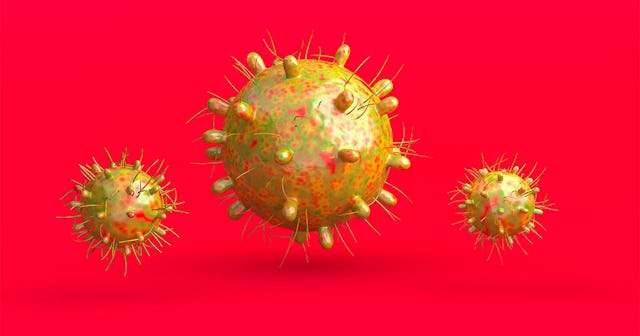We Stressed Over The Delta COVID Variant — Should We Freak About Lambda?

Viruses mutate. Tenth-grade biology students know that, but since many Americans refuse to accept tenth grade biology as fact (see: evolution), we can’t go too fast. Since viruses mutate, and COVID-19 is a virus, COVID-19 mutates. Currently everyone’s losing their respective minds about the Delta variant, also known as B.1.617.2, first discovered in India. The CDC calls it a “variant of concern” because of its increased transmissibility — and because available vaccines may be less effective against it. Now there’s a new variant in town. Lambda was first sequenced in Peru in August of 2020, and as of June 14, was designated a “variant of interest” by the WHO.
Now it accounts for 81% of the COVID-19 samples in Peru. It makes up 31% of the cases in Chile. It’s been found in 29 countries. So Americans are starting to wonder: we freaked out over Delta. Should we go nuts over Lambda?
Yeah, it’s starting to sound like an epidemiological version of fraternity row. Stay with us.
Delta vs. Lambda
In late May, 3% of all United States Covid cases were attributable to Delta. Now it’s somewhere around 58%. Yes, it spreads that rapidly. Scary enough for you? It’s scary enough for the CDC to call Delta a “variant of concern.” In April, people gathered for an outdoor wedding in Texas. They were required to produce proof of vaccination. Somewhere, Delta still got loose — despite the “outdoor” and “vaccinated” parts. Of the six people who fell ill, two people had received the Pfizer vaccine. Two people had been shot up with the Moderna vax. The other two, from India, had gotten the Covaxin shot. One of them died.
While Fauci says the CDC masking guidelines haven’t changed in the face of Delta, the WHO says “vaccines alone will not stop community spread” and I should not be seeing your faceholes in Target.
Lambda’s all over South America. But right now, it only accounts for 1% of all United States cases. The WHO calls it a “variant of interest.” That’s code for: it could be worrying. Maybe. The WHO says Lambda has shown high rates of community transmission as COVID-19 cases rise. Its mutations make it possible that it could be more transmissible than other strains, and possibly more vaccine-resistant.
Possibly.
Why Do Those Spike Proteins Matter Again?
MARVIN RECINOS/AFP/Getty
Take a deep breath. (No, through your mask — the WHO says to leave it on.)
Viruses mutate. It happens all the time. But we worry when they mutate in certain ways. One worrying way that COVID-19 can mutate: on the spike protein. That spike protein’s super important.
Here’s why. Pfizer and Moderna vaccines are mRNA vaccines. They’re new! They’re improved! They use a harmless bit of virus as a “messenger.” This bit teaches our cells to make a certain protein — a spike protein, which our cells recognize as an intruder and learn to fight. Our immune cells, therefore, make antibodies to COVID-19 without ever encountering the live virus. It’s a neat bit of work. Yay science!
Except that spike protein has to match, or our cells won’t recognize it.
That’s why Delta is “a variant of concern.” Its spike proteins are different enough that it’s not only more transmissible, there’s evidence that vaccines won’t work as well against it — though all vaccine manufacturers say their vaccines are effective against the variant.
Lambda has seven mutations in the spike protein, some of which are found in other variants. The Delta variant has only four concerning mutations on its spike protein, though it has more mutations overall (at least 13 compared to Lambda’s 8). Some of Lambda’s spike protein mutations have been described as “unusual.”
Eek.
So Commence Losing It?
No. Or at least, not yet.
Nathaniel Landau, a microbiologist at the New York University Grossman School of Medicine, told The New York Times that, “I think some of the interest is just based on the fact that there’s a new variant, and it has a new name… But I don’t think there’s any more reason to be concerned than before we knew about this variant.” There is, he says, no reason to think that Lambda will out-compete Delta in the United States.
Because South America doesn’t have a ton of resources for viral surveillance, a lot of the freak-out over Lambda comes down to a lack of what we don’t know instead of what we do. “It’s just that we know so little that it lends itself to a lot of speculation,” Landau said.
And evidence says that while Pfizer, Moderna, and CoronaVac vaccines tend to produce less antibodies when they’re exposed to Lambda, they are effective against it. Unfortunately, preliminary data suggests that the Chinese vaccines, such as Sinovac or Sinopharm, which have been widely used across South America, may not be as effective against Lambda — or may not be as effective at all, especially against Delta.
Should Americans freak out about Lambda? Short answer: No.
Freak out about Delta for now.
This article was originally published on